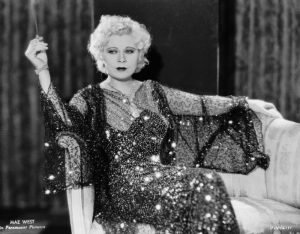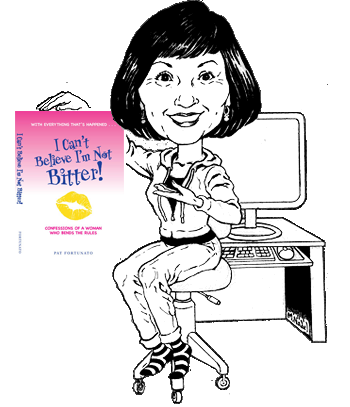“A Comforting Fantasy”
Apr 18
 Ah, the lies we tell ourselves.
Ah, the lies we tell ourselves.
That teeny bowl of pistachio ice cream won’t wreck our diet.
The guy/gal who didn’t call back after that great date: he must have died.
We will clean out the storage unit that’s costing 200 hard earned bucks a month. Next month.
And then there’s the biggest whopper of all: that the very rich are unhappy, because, as we’ve been told so often, money doesn’t buy happiness.
No, it doesn’t. But as a wise old bird (not lacking in funds) once told me: It sure can buy off a lot of unhappiness.
Face it, if you’ve got a problem, you can usually make the situation better with a few shekels in your pocket. For example, you can dry your tears over a broken romance at that scrumptious resort in Sicily featured in White Lotus, with soft linen handkerchiefs (no plain old Kleenex for you, you pampered thing), while you sip prosecco, or bloody mary’s, or whatever the bloody hell you choose. Because you can. Okay, it won’t bring him/her/they back to you, but it sure beats sobbing your eyes out at the local gin mill with nary a soft hanky in sight. Those bar napkins are SO rough.
Really, it’s pretty obvious: you can be miserable even if you have billions (or mere millions), but there are options that the super- rich have to ease their pain, such as personal trainers, lots of therapy, vacations, great meals, silk sheets, whatever floats your boat (or yacht).
Why, you may ask, am I railing about all this at this particular point in time? It started with Succession, or more aptly, a column in The New York Times by the ever-astute Michelle Goldberg, who notes that the show offers a “comforting fantasy that the rich are miserable.” In fact, she says, “one dark pleasure of Succession is that, “in a plutocratic age, it makes having an obscene fortune look like a curse.” In her excellent article, Goldberg points to the “relentless corporate blandness” of the series, and to its “emotional austerity, a world in which love is always a weakness.” Too true, Michelle, too true.
But statistics show (a phrase that can mean almost anything) that “people actually are happier when they make more money.” Really? No shit, Sherlock?? Alert the media. Whoops. This study was done by CBS News, so I guess they’ve already been alerted.
Meanwhile, a point made in that study, and elsewhere, is that above a certain level of income, happiness levels off. In other words, if you have enough money to fulfill your basic (and not so basic) needs, then you’re happier than if you’re always worried about money. But if you’re rich, whatever that means these days, you probably won’t be happier if you become richer, or even super-rich. That would be the .01 per cent of the population, which the hapless siblings of the disgustingly rich Roy clan inhabit in the show.
Personally, I love Succession, not to gloat about the “poor little rich girl’ (and boys) in all the episodes, but because the writing is amazing and so are the actors, some of whom are British and “do” American so well. The third episode of the last season is so good, I may do a whole blog about it. What I didn’t love, and I may be the only one in America who didn’t, was the movie Titanic. Thought it was overblown and hokey. But what really got to me was the way they portrayed the poor folks down there in steerage laughing and dancing and having a high old time, while the miserable rich gentry in first class were stuck with stodgy companions and oh too elegant manners. Balderdash! Where would you rather be: in steerage or first class? This is not a trick question.
What I didn’t love, and I may be the only one in America who didn’t, was the movie Titanic. Thought it was overblown and hokey. But what really got to me was the way they portrayed the poor folks down there in steerage laughing and dancing and having a high old time, while the miserable rich gentry in first class were stuck with stodgy companions and oh too elegant manners. Balderdash! Where would you rather be: in steerage or first class? This is not a trick question.
And so, boys and girls, we come back to the question about whether money buys happiness. Not for the Roy sibs, it doesn’t, or so it would seem so far. And even in real life, there truly are the miserable rich. Just as there are the miserable poor.
Can you be happy as a poor person? Sure. Many have done it.
But that quote, often attributed to that great philosopher Mae West, says it best:
“I’ve been poor and I’ve been rich, and rich is better.”
And that, my friends, is no lie.



I actually feel sorry for the Roy family. The nicest one is a former hooker, and that’s saying something!
I agree. And she even admitted she was only marrying into the family for the money!
I hated Titanic for many reasons and that was only one. Vapid and stupid.
But how do you really feel? And what about Succession? A fan or not? Friends tell me that they won’t watch it because “there’s no one to like.” True, but I like it anyway. Although I couldn’t take Curb Your Enthusiasm after a while for that very reason: there are no socially redeeming qualities in any of the characters. But it is funny, and comedy, as we know, is hard.
As to “rich is better “ I think it was Reverend Barker who said…” I d rather be miserable in the back of a Rolls Royce than in a Ford!
Amen to that
Ah, Dr. Barker, I do miss him! Once someone asked him if he were marching for a certain cause, and he said, “My money is marching.” He didn’t do marches. Not that he disparaged any one who did, he just was who he was, and wouldn’t be shamed by anyone who told him what he SHOULD be doing, as opposed to what he WANTED to do. And yes, it’s better in a Rolls.
A Night To Rember is a better Titanic movie.
Yes, much better. And I don’t remember any romantisized version of steerage, which was pretty bleak, although the Titanic apparently prided itself on having a better class of steerage, if that’s not an oxymoron.
I never saw Titanic because I was so sure I would hate it. About money: I’m with you, Pat!
You would hate it, trust me. And I also felt that they weren’t even a good couple: she seemed so much more mature than he did.
Wonder if anyone agrees with me.
I just had a bowl of pistachio ice cream last night. I’m always looking for something to relate to in a post.
I believe happiness/money curve probably levels off for most people.
Life is never as simple as one thing.
Life is never simple, period! But ice cream and having enough money to feel comfortable sure helps.
BTW: My father came from near poverty, and never made much money, but he invested wisely, was careful with finances, and had a life in retirement that he thought was perfect. He was happy with what he had, and felt rich because he could eat at the diner or local restaurant whenever he wanted, lived in a nice place, and of course, had wonderful children. OTOH I wonder what I would have been like if I was born into a family like the Roys. Probably like the oldest son, who pretty much dropped out of the family business.
It all seems too shark-like for the likes of me.
I started watching White Lotus but after first episode I never watched it again. I didn’t care if they all killed each other or drowned in a pool.
Give me The Honeymooners and I’ll be happy.
I understand your disdain about White Lotus, but I loved the scenery—and it WAS Italy.
Once, I took (dragged more like) a friend to see a favorite, and very long, movie, Christ Stopped At Eboli. When I asked if he like the movie, he said, I admired it. Not liked it. That’s how I felt about The Honeymooners. It was brilliant in its way, but I hated the stark setting and all the arguing (even though they were all basically good people). My grandmother hated the show: she couldn’t understand how people could act like that and stay together. I never asked my grandfather . . .
I began to see The Honeymooners years later as a critique of capitalism with its false message that anyone can make it with a little spunk and perhaps some luck. every week we saw poor Ralph and his pal Norton involved with some hair-brained scheme to make some money. Or not, Ralph thinking he had inherited a fortune which turns out to be a parrot.
In the end, of course, Ralph and Alice are still living in their dreary apartment but still devoted to each other and to their friends Ed and Trixie.
Well, I get your point, but I never thought that anyone could make it with “a little bit of luck,” as the song goes, especially with hair-brained schemes. I did believe in hard work, though, and that you could build a nice (not rich) life with that. You could, back then. Not so sure about now. Anyway, about the show: Yes, they were devoted to each other, but I didn’t like the vibe.